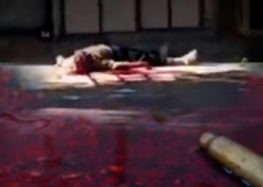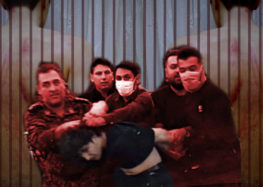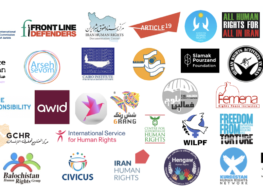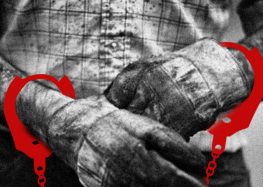Callous Border Security Guns Down 70 Couriers in Iran
Government Should End Pattern of Illegal Use of Lethal Force in Northwest Border Provinces
Iranian Kurds and Unemployed Resort to Dangerous Black-Market Work
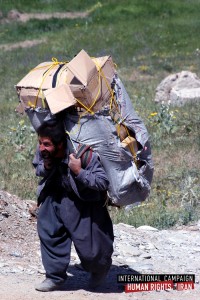
Bardehnaz Piranshahr border. Photo by Shirkoo Jahani for the International Campaign for Human Rights in Iran
(27 April 2012) The Iranian government should immediately investigate the numerous cases of border security forces killing couriers in the northwestern provinces of West Azerbaijan, Kurdistan, and Kermanshah, and hold accountable those responsible for such callous use of unlawful force, the International Campaign for Human Rights in Iran said today. The government should also review its border security measures and the growing pattern of excessive use of lethal force, and should adopt clear polices to stop unlawful and unnecessary killing, the Campaign added.
“The ongoing cold-blooded killing of cross-border couriers (often called kulbar) by security officials is unacceptable, and the Iranian government must put an end to it,” Campaign spokesperson Hadi Ghaemi said. “The use of lethal force against these people, who are unarmed and are simply avoiding authorities, is unjustifiable, violates international law, and must be investigated.”
The Campaign has documented 74 deaths and 76 injuries to individuals working as kulbar, couriers that carry illegally-imported goods, such as tobacco, electronics, and tires, on their backs, and kasebkar, tradesmen who transport similar goods into larger towns. These individuals live and work in the predominantly Kurdish northwestern border provinces of Iran’s West Azerbaijan, Kurdistan, and Kermanshah. These killings and injuries, featured in a full list below, all occurred between March 2011 and April 2012 within the context of a new government border control program.
Of the 74 deceased kulbar and kasebkar, 70 were allegedly shot and killed by government border forces, and four reportedly died as a result of landmine explosions, avalanches, and exposure to severe cold. Among the 76 injured, eight were hurt during landmine explosions, and the rest by border security. These numbers only represent individuals whose identities and case particulars the Campaign was able to verify independently or through reliable local sources. There may be many more cases; however, due to the economic and geographic isolation of the kulbar these cases are likely underreported.
“Iranian law regards the activities of the kulbari as a crime that is punishable by several months of detention or a fine equal to the value of the seized commodities,” explains a March 2012 report by UN Special Rapporteur on human rights in Iran Ahmed Shaheed. “[H]owever … Iranian border guards [reportedly] indiscriminately shoot at these individuals, thereby killing and wounding dozens of kulbari annually, as well as their horses.”
A local expert on the kulbar told the Campaign that, in practice, fines can be several times the value of the seized goods. “These kulbar are unarmed—if they were armed it would aggravate any charges they might face. If they encounter the authorities, they simply try to run away to avoid what would be a hefty fine. Because they usually cannot afford such an amount, they would be thrown in prison,” the expert added.

Bardenaz Piranshahr border. Photo by Shirkoo Jahani for the International Campaign for Human Rights in Iran
The border region near the town of Sardasht, in West Azerbaijan, has seen the most alleged killings of border couriers and tradesmen by the Iranian police, followed by the Marivan and Baneh border regions in Kurdistan.
A kulbar who has worked almost 10 years in the border town of Baneh told the Campaign,
Because of the border closing project, during the past several years, without regard for our lives, the police have been waiting in mountainous and hard-to-pass areas for us. After warning us to stop, without firing a warning shot, they shoot at us directly…. Several times during these past few years, bullets have flown by the side of my head and hands….
Kulbar carry goods such as cigarettes, textiles, and video equipment. Even if we were to escape, we would not cause heavy damage to the government, warranting their wanton direct targeting of us….
Several of my friends, who were their families’ breadwinners, were killed by the police and military forces…. The people of this region have no other option of employment. They are taking risks with their lives in order to feed their families.
Another local source told the Campaign,
As an example, on 22 March 2011, during confiscation of goods from several border tradesmen in the town of Nosood, the Deputy Border Commander of Nosood shot at several kulbar inside the town’s Moallem Square. A young Kurdish man by the name of Pourmand Madhatnia was murdered during the shooting and three other citizens were injured.
The killing of Madhatnia triggered protests by locals of the town. The police initially detained the officer involved in the shooting, then transferred him to a post in another town. Later, however, the police attacked and arrested several of those who had participated in the protest, the source said.
In an earlier example of excessive force, in February 2010 (thus not mentioned in the list below), police severely beat Mohammad Reza Khalidi, a 60-year-old Kurdish-Iranian bulldozer operator in the border region of Chalehcheremi in Nosood, leading to his death. Authorities had mistakenly thought Khalidi was a kulbar.
A close friend of Khalidi told the Campaign, “After his family filed a lawsuit with the military court, the police denied the incident, even though several locals testified to it, and after several months, under pressure from the police, the case was shelved.”

- Caravan of kulbar and their horses through the snowy mountaintops. Photo by Shirkoo Jahani for the International Campaign for Human Rights in Iran
Some kulbar and their families and friends have reported that border security have intentionally shot and killed their horses and other beasts of burden used to transport goods. Sources in the towns of Marivan and Sardasht also claim that police have set fire to several animals carrying smuggled fuel into Iraqi Kurdistan, burning them alive.
According to sources, police kill the animals to increase the cost of the trade for couriers, tradesmen, and their families, aiming to deter this type of work in the border areas.
“The government is basically punishing poverty. Attacking the kulbar, who are from some of the poorest areas of Iran, is using lethal force against people relegated to this activity by their economic circumstances,” Ghaemi said. “Furthermore, killing the animals they use for their trade amounts to imposing a punishment without due process.”
Ghaemi added, “The high number of unwarranted kulbar deaths requires an immediate change in government policy and the international community’s sustained attention.”
Lack of Redress and Accountability
The Campaign learned that dozens of injured kulbar and the families of killed kulbar filed complaints with the Iranian Judiciary. In some cases the Judiciary effectively quashed hearings by postponing them indefinitely. In other cases, according to the families, authorities never even responded to their complaints. In one case authorities paid the complaining family diyeh or blood money, which is the financial compensation provided in cases of murder.
Two Kurdish kulbar, who were paralyzed in their arms and legs during separate incidents of direct shootings by the police, filed lawsuits against the police in military courts. Their family members told the Campaign that their lawsuits have not been addressed, despite testimonies by several eyewitnesses and reports from the medical examiner. One of the kulbar was from the Nosood border region in Kermanshah Province, and the other from the Rash Mountain border in the town of Salmas in West Azerbaijan Province.
Another obstacle the kulbar face is lack of access to legal representation and the courts. The family of the paralyzed kulbar from Nosood told the Campaign he could not afford a lawyer. After several years of pursuing a lawsuit in military court and repeated postponements by the court, his case has in effect been abandoned since the court has not reacted to his lawsuit. The other paralyzed kulbar, from Salmas, does have a lawyer, his family told the Campaign. Nevertheless, the military court judge, who is presiding over the case in Tehran, has postponed his court sessions every month for several years, despite his vigorous pursuit of the case, the family said.
International Concerns and Law
In his March 2012 report, UN Special Rapporteur on human rights in Iran Ahmed Shaheed raises concerns over the reported “systematic killings of kulbars (back carriers) and kasebkaran (tradesmen), Kurds residing in border areas. The kulbaran, who ferry cargo across the border on their backs or smuggle commodities such as tea, tobacco and fuel to earn a living, are particularly affected.”
International law grants states the authority to control their borders, including imports and exports to and from their country. Nonetheless, international law does put limitations on law enforcement.
These killings violate the right to life enshrined in article 6 of the International Covenant on Civil and Political Rights, to which Iran is a state party.
The UN Human Rights Committee, in general comment 6 on the right to life, considered “that States parties should take measures … to prevent arbitrary killing by their own security forces. The deprivation of life by the authorities of the State is a matter of the utmost gravity. Therefore, the law must strictly control and limit the circumstances in which a person may be deprived of his life by such authorities.”
Christof Heyns, UN Special Rapporteur on extrajudicial, summary or arbitrary executions, explained in October 2011, “[L]ethal force should not be used unless there is a reasonable suspicion that the suspect has committed a crime involving serious violence, or has threatened to do so, [but] that is not enough. For deadly force to be used by the police, there must be an immediate or ongoing threat to the public if the person were to escape.”
The Economic Landscape of the Kulbar and Kasebkar

Dead horses belonging to kulbar. Photo provided by local sources.
The kulbar and kasebkar are mostly active in the mountainous border region between the towns of Qasr-e Shirin and Khoy in Iran, along its northwestern borders with Iraq and Turkey. This geography spans the provinces of Kermanshah, Kurdistan, and West Azerbaijan.
This region is predominantly populated by Kurds, an ethnic minority in Iran, and is marked by a general dearth of economic infrastructure and development proportionate to the population, resulting in high rates of poverty and unemployment. The Iranian government puts the unemployment rate for the region at 14 percent, but local experts and activists say this number is a misrepresentation and the real rate is well over 20 percent.
Due to the high rate of unemployment, many locals engage in transporting and importing foreign goods through unofficial channels in return for a small fee. These kulbar carry packages on their backs or on horses through hard-to-reach mountain passes over borders and into the region’s towns and villages. Individuals who transport goods by car into larger towns and the country’s central region are called kasebkar or tradesmen. Kasebkar typically employ kulbar.
“Goods transported by kulbar and border tradesmen into the country mostly include audio and video equipment, clothing and fabric, makeup, car tires, cigarettes, and, in a very limited way, alcohol,” a local expert familiar with the subject and with those regions where encounters between the kulbar and security forces frequently occur told the Campaign.
Massoud Kordpour, a Sanandaj-based journalist and activist, told Deutsche Welle news agency in an interview in April 2011: “You see all the individuals who are kulbar and who die for this. This phenomenon of working as a kulbar shows that the economic situation of the region is so bad that people are forced to take on a job that has a security component and carries the danger of death and being shot.”
The International Campaign for Human Rights in Iran calls on the Iranian government to review its border security measures, especially the growing pattern of border security forces killing kulbar and kasebkar without justification. Furthermore, the Campaign adds that the government should investigate those killings that have already occurred, hold the perpetrators accountable, and adopt clear polices to stop unlawful and unnecessary killing.
KULBAR AND KASEBKAR KILLED AND INJURED
MARCH 2011 TO APRIL 2012



